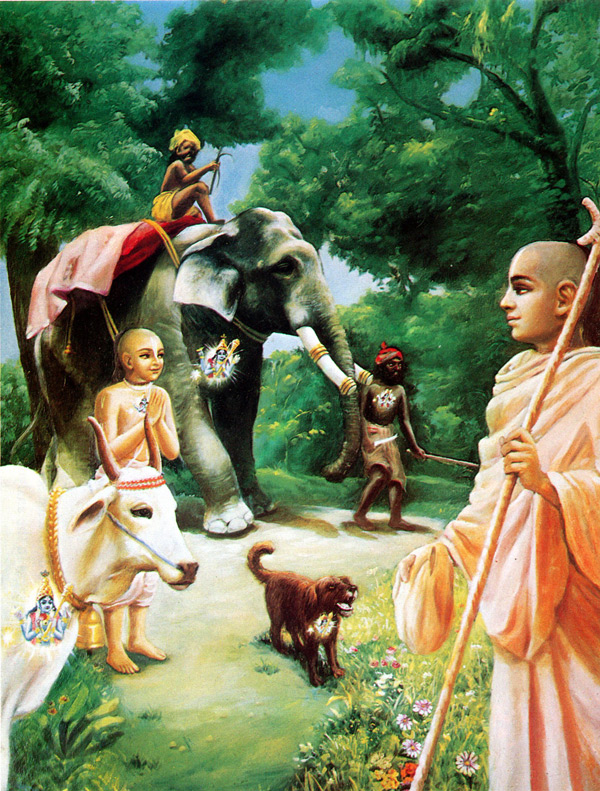
Picture: Seeing God in Everything
Moods are a bane to your spiritual life. They are caused by attachment; life is not going the way you think it should. This thought authors an emotion, and oftentimes this feeling is a well-worn track; like a rut on the road that draws an unwary traveler into a direction that gets you stuck.
Moods can be of two types, a rajasic mood in which anger comes in cutting thoughts and sharp words, slashing your way through the day. The other type is tamasic, a depressive mood that hangs around you like a dark cloud allowing no light to penetrate. Either or both of these moods can dominate the mind and bring the sadhaka to a dead end.
While having a reaction to life’s events can happen in a blink of an eye, and the body and mind can have momentary shock, there is a time limit when that reaction will simply dissipate. Then there are those times when you nurse a feeling, adding new energy for diverse purposes that will extend those feelings and create a mood.
You may have an expectation that life should be different: easier, more prosperous, smoother relationships, healthier, kinder, etc. It is not that these are not perfectly good aspirations to have in life, but to be attached to these aspirations creates a mood; hanging on to that mood brings you down, undoubtedly bringing others down as well.
Master said that Sri Yukteswar warned him about becoming moody and having an unregulated life. Perhaps these are connected, moods being a result of unregulated thinking. We generally think of moods being an emotion, yet it originates in the reasoning mind, as we first entertain an idea of how life should be versus how it is.
Using jnana, discrimination, you surgically remove or cancel the expectation that life should be different. This does not mean you do not aspire for something better, however, you cut out the expectation. Do you see the difference? For that difference is crucial. Expectation is attachment, aspiration ties into your creativity. Attachment binds you to this world, aspiration lifts you up, and when done properly unites you with higher consciousness.
It is compassion that wants a better world. You see the suffering in this world and aspire for healing: holiness, happiness and health for one and for all. A prayerful state of mind makes you look out to the world from the eyes of God; divine energy flows out from your heart in a compassionate living river. You then feel prompted into action to alleviate the suffering of another. Part and parcel to this attitude is the peaceful joy that flows throughout your being.
In contrast, when you have an attachment to the idea that this world should be better; should just work better, be more equal, just, etc., that attachment will make you feel angry or depressed when you see the poor state this world is in. Anger prompts cutting words left right and center for the villains, or you withdraw from this world into a dark mood. Neither of these responses connect you with higher consciousness, rather it creates doubt in there being anything higher than the suffering you see.
In both of these examples the world is exactly the same, however aspiration is freeing, attachment binds you. You must be a careful guardian of your thoughts and feelings in order to have true freedom. While a dark thought or feeling can erupt in a micro-second, it is likely that there has been a build-up period coming for sometime; a preceding lack of intensity in your sadhana. Constant remembrance of God frees you, forgetfulness binds you. It is a simple formula, and it determines your taking the higher road to true, lasting happiness.